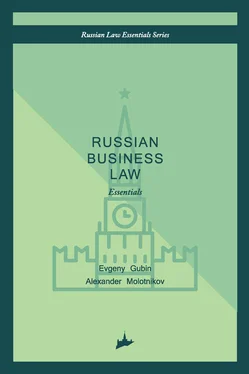Evgeny Gubin - Russian business law - the essentials
Здесь есть возможность читать онлайн «Evgeny Gubin - Russian business law - the essentials» — ознакомительный отрывок электронной книги совершенно бесплатно, а после прочтения отрывка купить полную версию. В некоторых случаях можно слушать аудио, скачать через торрент в формате fb2 и присутствует краткое содержание. Город: Moscow, Год выпуска: 2016, ISBN: 2016, Жанр: foreign_language, Юриспруденция, popular_business, на английском языке. Описание произведения, (предисловие) а так же отзывы посетителей доступны на портале библиотеки ЛибКат.
- Название:Russian business law: the essentials
- Автор:
- Жанр:
- Год:2016
- Город:Moscow
- ISBN:978-5-9904334-9-6
- Рейтинг книги:3 / 5. Голосов: 1
-
Избранное:Добавить в избранное
- Отзывы:
-
Ваша оценка:
- 60
- 1
- 2
- 3
- 4
- 5
Russian business law: the essentials: краткое содержание, описание и аннотация
Предлагаем к чтению аннотацию, описание, краткое содержание или предисловие (зависит от того, что написал сам автор книги «Russian business law: the essentials»). Если вы не нашли необходимую информацию о книге — напишите в комментариях, мы постараемся отыскать её.
Russian business law: the essentials — читать онлайн ознакомительный отрывок
Ниже представлен текст книги, разбитый по страницам. Система сохранения места последней прочитанной страницы, позволяет с удобством читать онлайн бесплатно книгу «Russian business law: the essentials», без необходимости каждый раз заново искать на чём Вы остановились. Поставьте закладку, и сможете в любой момент перейти на страницу, на которой закончили чтение.
Интервал:
Закладка:
Consequently, the following provisions of the CC of the RF need to be taken into account upon conclusion of the contract:
– Subsection 1 of Section 3 of Part 1 of the CC of the RF (general provisions on obligations);
– Subsection 2 of Section 3 of Part 1 of the CC of the RF (general provisions on contracts);
– Part 2 of the CC of the RF (individual types of obligations);
– Chapter 9 of the CC of the RF (transactions) – with some exceptions to be discussed below.
Specific regulation of individual types of contracts can be found not only in the CC of the RF, but also in other laws and regulations (e.g. the Urban Planning Code of the RF).
1.2. General Provisions on Contracts
The CC of the RF contains general provisions pertaining to every type of contract, and provisions regulating certain types of contracts (public contract, contract of adhesion, etc.), as well as provisions on individual types of contracts (purchase and sale contracts, rental agreements, etc.). The provisions on individual types of contracts cover the main rights and obligations of the parties, the rules of concluding a contract, formal requirements of a contract, etc.
Furthermore, the parties can conclude not only the types of contracts which are named directly in the CC of the RF, but also contracts which are not specified therein. The latter category can include contracts containing elements of several named contracts (mixed contracts), and special contracts, which do not contain elements of named contracts (unnamed contracts). Depending on the type of concluded contract, different principles can be distinguished with respect to the regulation of the contractual relationships of the parties.
Relationships under named contracts are defined by the parties, taking into consideration the rules on those contracts provided in the CC of the RF. The imperative norms governing the contract cannot be changed by the parties. When there are dispositive rules governing the contract, the parties can agree not to apply those provisions, or to establish different rules. The criteria for imperative norms have been identified in the Decision No. 16 of the Plenum of the Supreme Court of Arbitration of the RF, dated March 14, 2014. [44] See Decision No. 16, dated March 14, 2014, of the Plenum of the Supreme Arbitration Court of the RF, "On the Freedom of Contract and Its Limits," // “ConsultantPlus” Legal Directory System.
The Decision No. 16 of the Plenum of the Supreme Court of Arbitration of the RF, dated March 14, 2014, "On the Freedom of Contracts and Its Limits," was the first decision to establish the presumption of the dispositive nature of the norms governing individual types of contracts. According to the Plenum of the Supreme Court of Arbitration of the RF, the legal norms governing the rights and obligations under the contract shall be considered to be imperative, if those include a clear prohibition on adding different clauses to the contract. The norm is also of an imperative nature, if it is necessary for the purposes of safeguarding special interests protected by law (interests of the weakest party of the contract, third parties, public interest, etc.), for avoiding a great disparity between the parties’ interests. In addition, the imperative nature of a legal norm can be implied from the nature of the legislative regulation pertaining to a certain type of contract. In other scenarios, the norm should be considered to be of a dispositive nature.
With respect to the relationship under mixed contracts, or contracts which have elements of a mixed contract, the rules governing these contracts apply in respective portions, unless the parties agreed otherwise, or the rules are implied based on the nature of the mixed contract.
As for unnamed contracts, the rules on individual types of contracts provided in the CC of the RF do not apply directly. However, if the parties do not set in the contract the rules governing a particular aspect of their relationship, then the provisions on the individual types of contracts of the CC of the RF may apply by analogy (analogy of the law – Clause 1 of Article 6 of the CC of the RF).
In any of the aforementioned scenarios, the parties have the right to agree that the individual terms of the contract shall be determined by standard terms developed for contracts pertaining to the respective type, and published in the press (Article 427 of the CC of the RF). In the event that the contract does not contain a reference to such standard terms, they can be applied to the relationship of the parties as customs of trade.
The general stipulations of contract law in the CC of the RF includes provisions applicable to certain types of contracts: public contract, contract of adhesion, preliminary contract, framework agreement, option agreement, subscription contract, and the contract for the benefit of third persons.
1.2.1. The Rules for Concluding Contracts
1.2.1.1. General rules for concluding a contract
As a general rule, a contract is concluded by the means of one party sending an offer, and the other party accepting it. The contract shall be considered to be concluded from the moment of receiving the acceptance by the party which has sent the offer.
Furthermore, a contract shall be considered to be concluded, if an agreement in the required form has been reached between the parties on all of the essential terms of the contract (Article 432 of the CC of the RF). The essential terms of the contract are:
– the subject matter of the contract;
– the terms that are named in a statute, or in other legal acts, as essential or necessary for contracts of the given type;
– the terms with respect to which, by declaration of one of the parties, an agreement must be reached.
1.2.1.2. Declaring the contact as unconcluded
If any of the essential terms of the contract have not been agreed on, the contract, as a general rule, shall be deemed to be unconcluded. In this respect, the following factors shall be considered:
– the party cannot claim that the contract is unconcluded if: first, that the party has accepted the performance of the contract or otherwise acknowledged the validity of the contract; second, considering the particular circumstances, such a claim will contradict the good faith principle (Clause 3 of Article 432 of the CC of the RF);
– the contract shall not be considered as unconcluded, if the essential term, with respect to which an agreement has not been reached, can be covered by the general rules on obligations, or by a framework agreement. The application thereof shall not, however, be in conflict with the nature of the specific contract. [45] See Informative letter No. 165 of the Presidium of the Supreme Court of Arbitration of the RF, dated February 25, 2014, “On the Overview of the Judicial Practice Regarding the Disputes Related to the Declaration of Contracts as Unconcluded,” // “ConsultantPlus” Legal Directory System
1.2.1.3. State registration of contracts
Some contracts require state registration. Such registration is required, for example, for real estate rental agreements concluded for a period of not less than one year (Clause 2 of Article 609 of the CC of the RF), and for commercial concession contracts (Clause 2 Article 1028 of the CC of the RF). For third parties, the contracts which by law require state registration, shall be considered concluded from the moment of such registration. [46] The finding that the contract, which has not undergone state registration, shall be deemed concluded for third parties and not for the parties of the contract, has been determined in Federal law No. 42-FZ, dated March 8, 2015, “On Amending Part One of the Civil Code of the Russian Federation,” which came into effect on July 1, 2015.
Such a contract creates obligations for its parties, and cannot be declared by the courts as an unconcluded contract.
Интервал:
Закладка:
Похожие книги на «Russian business law: the essentials»
Представляем Вашему вниманию похожие книги на «Russian business law: the essentials» списком для выбора. Мы отобрали схожую по названию и смыслу литературу в надежде предоставить читателям больше вариантов отыскать новые, интересные, ещё непрочитанные произведения.
Обсуждение, отзывы о книге «Russian business law: the essentials» и просто собственные мнения читателей. Оставьте ваши комментарии, напишите, что Вы думаете о произведении, его смысле или главных героях. Укажите что конкретно понравилось, а что нет, и почему Вы так считаете.












